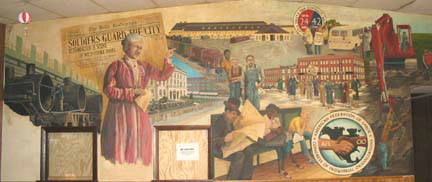|
The Ghost of Woody Guthrie
CD by Bucky Halker & Andy Dee
www.buckyhalker.com
Reviewed by Mike Matejka
Woodrow Wilson Guthrie (1912-1967) is an American musical genius few people know, outside of leftists and folkies, but we sing his songs.
Yet just gather some Americans and start to sing “This Land is Your Land” and everyone knows to join in, “this land was made for you and me.” But few people know the itinerant Oklahoman who wrote that patriotic anthem that celebrated the land and the people, not armies or “bombs bursting in air.”
As a second grader in Ashland, Wisconsin, Clark Halker, learned “This Land.” It stuck with him; Clark Halker eventually became “Bucky” Halker, a talented musician, comfortable with folk, country, rock and roll or the blues. No matter where Bucky traveled musically, scrawny old Woody kept showing up. Halker learned he and Woody had a lot in common: working class politics, music, women and the open road.
Bucky not only became a polished musician, he completed a History PhD. In his studies, he poured through old 19th century labor newspapers and pamphlets, finding workers’ poems and songs about their jobs, unions and aspirations. That eventually became his thesis and a book, For Democracy, Workers and God.
Guthrie’s life was not a storybook tale. His family went from success to poverty; his sister and a daughter died as children in tragic fires. Woody wooed women everywhere but was rarely loyal to his wife and children. He died from Huntington’s Disease, barely able to speak or move, just when his music was being rediscovered by the 1960s folk music revival.
Bucky kept coming back to Woody, tapping that crazy, gifted, freight-train hopping, oddly American spirit.
Bucky was asked to write a Guthrie biography. He spent many hours in the Guthrie archives in New York. He befriended Guthrie’s last wife, Marjorie and his daughter Nora.
Instead of a Guthrie biography, Bucky and Andy Dee produced a two-disc album, The Ghost of Woody Guthrie.
Ghost is a blend; there are four original Guthrie songs, played in contemporary style. Bucky’s original pieces complete the discs, reflections on Guthrie’s life and spirit.
Guthrie’s Huntington’s disease echoes through two songs, “Words that I can’t speak,” where they dying singer asks a visitor to light a cigarette and “just place it between my lips,” and “Everybody’s got a monkey.” No matter how good a person is, there’s always a fault, a “monkey on their back” that rides them.
Guthrie’s sister Clara died in a fire when Woody was a child; Bucky’s family lost a sister before he was born. He asks for both of them in a plaintive tune, “Who took my sister away?”
Guthrie could be scathing in his political anger, as can Bucky. “Ridin’ into Springfield” slams Illinois’ infamous political reputation. “Big Hat” salutes the nation’s dark political spectre, “Shotgun” Dick Cheney.
Woody’s loves get their homage. “Woody and Mary, 1933” is about his first wife in Oklahoma, Mary Jennings. Later Woody married Marjorie Mazia, a New York trained dancer; despite Woody’s travels and infidelities, Marjorie was the one who cared for him and kept his name alive. “Marjorie Dear” is a charming waltz, echoing a dancer’s delicate steps.
Another delight of this two disc set is not only the music, but Bucky’s extensive liner notes, musing on Bucky’s life and how he and Guthrie continued to intersect, two itinerant musicians who not only tried to sing a song, but send a message.
Guthrie always identified himself as working class; Bucky revives two Guthrie classic, “Jackhammer John” and “I Ain’t Got No Home.” Bucky includes an original piece, “The Ballad of 393,” a homage to Laborers International Union Local 393 in Marseilles, Illinois, a local which regularly hosts Bucky’s performances. Like “Jackhammer John,’ “393” celebrates skilled labor,
“Workin’ on concrete,
layin’ down pipe,
puttin’ up scaffold,
blowin’ dyno-mite
Locks, dams, building
your roads,
393’s got a mighty
big load.”
Numerous Guthrie ballads roll along the open road, Bucky shares his own roads from childhood Ashland, Wisconsin in “They All Give Me the Blues”
The finest song is the last, “Woody Guthrie’s Union.” Bolstered with a children’s chorus, Bucky distills Woody’s message to one word, “Love” -- a love that includes not only singular relationships, but stretches to include humanity.
Woody would relate; the Ghost of Woody Guthrie includes quiet reflection, spirited anthems and a nice pinch of “stick it to the devil” attitude -- enjoy.
|



